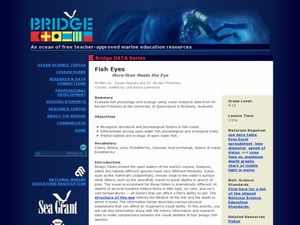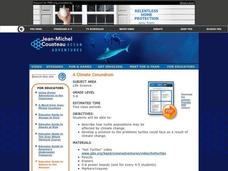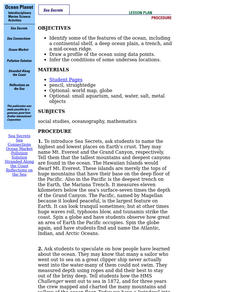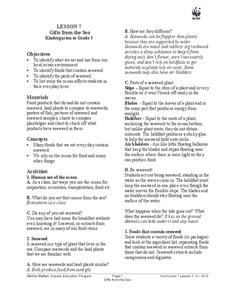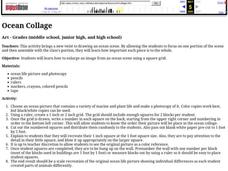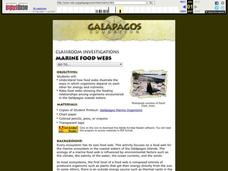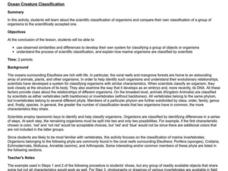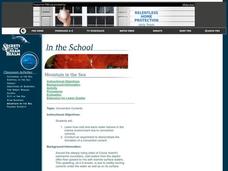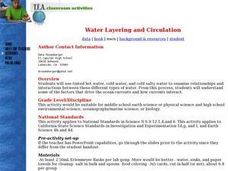Curated OER
Where's Dinner?
Upcoming marine biologists consider a list of organisms residing near the Lost City hydrothermal vents and construct a food web. They compare the food web to that of a cold seep community, of which they should have previous knowledge....
Curated OER
Fish Eyes - More than Meets the Eye
Inform your class about the adaptations in fish eyes: cones, lens size, endothermy, and speed of vision. The adaptations are related to diving behavior. Junior marine scientists compare the adaptations of four different fish species to...
Curated OER
Big Fleas Have Little Fleas
A benthic habitat hosts a vast collection of organisms and its structure influences the biodiversity. Middle-school marine biology explorers will discuss how corals impact structure, and therefore diversity, on the ocean floor. They draw...
Curated OER
A Climate Conundrum
After viewing a video and reading an article about the threatened turtles and tortises in The Amazon River area, collaborative groups create a poster or presentation about how we can help them. Several links to other related lesson plans...
Curated OER
What's for Dinner?
View a video presentation comparing chemosynthesis to photosynthesis. Review the findings of the 2004 Ring of Fire Expedition that studied biological communities around the hydrothermal vents of the Mariana Arc. In collaborative groups,...
NOAA
Biological Oceanographic Investigations – Signals from the Deep
The Deepwater Horizon oil spill directly impacted an area of the Gulf of Mexico the size of Oklahoma. A marine biology instructional activity looks at the impact of an oil spill on the deeper parts of the ocean. Scholars download actual...
Curated OER
Changing Planet: Fading Corals
Show the six-minute video, "Changing Planet: Fading Corals," and then demonstrate how calcium carbonate forms a precipitate in the presence of carbon dioxide. Separate your scientists into small groups to gather information about coral...
California Academy of Science
Academy Seafood Market and Fishery
What fishing method is the most sustainable? Find out through a fun, but meaningful game in which your little fishermen use different techniques to see what they catch. After the fishing activity is over, there are several discussion...
Curated OER
Ocean Planet: Sea Secrets
Students identify ocean features and draw a profile using data points on a map. Through discussion and research, they discover the importance of oceanography and plot a profile of the ocean floor in search for a vessel full of precious...
Curated OER
Gifts from the Sea
Students discover the oceanic food chain. In this healthy eating instructional activity, student investigate the fish we eat and the food the fish eat. Students discover what ocean animals eat seaweed and what everyday foods we eat...
Curated OER
Ocean Life Food Web
Students construct a food web representative of the Gulf of California. They use pictures to depict all of the organisms in the appropriate level of the web (producer, primary consumer, etc.)
Curated OER
Ocean/Beach Center
Students examine different types of ocean life. They classify sea shells and role play in the ocean center. They color and write about their experience in the ocean center and share their experiences with their classmates.
Curated OER
Ocean Collage
Students re-create an image from a marine life scene. They are given a single square of the entire picture to focus on. When all squares are completed, the picture is assembled.
Curated OER
Marine Food Webs
Students examine how food webs illustrate the ways in which organisms depend on each other for energy and nutrients, and make food webs showing the feeding relationships among organisms encountered in the Gal??pagos coastal waters.
Curated OER
Ocean Creature Classification
Students develop their own system for classifying a group of objects or organisms using observed similarities and differences. They investigate the process of scientific classification, and explain how marine organisms are classified by...
Curated OER
Secrets of the Ocean Realm - In the School "Mountain in the Sea"
Students learn how cold and warm water behave in the marine environment due to convection currents. Students also conduct an experiment to demonstrate the formation of a convection current.
Curated OER
Journey to the Unknown
Students explore the ocean depths. In this scenario based lesson plan, students pretend they are on a submarine in an unknown part of the ocean. By using clues the class discusses and determines where they are in the ocean. They follow...
Curated OER
Water Layering and Circulation
Students examine relationships and interactions between different types of water. They experiment with colored water of different temperature and salinity and discuss how the results relate to real ocean currents.
Curated OER
Art/Ocean Scene
Students draw and color an ocean scene based on the paintings of Wyland. In this ocean art lesson plan, students view slides of seascapes before they complete their project using oil pastels.
Curated OER
Oceanography: Understanding the Relationship Among Ocean Food Chains
Fourth graders explore relationships among organisms involved in ocean food chains to investigate interdependence of the organisms.
Curated OER
Ocean Observation
Students describe the different methods used by MBARI researchers to study the ocean. In this ocean lesson plan students research the Internet and use the information they find to write in their journal.
Curated OER
Ocean Careers Investigation
Students gather information about different careers of the Ocean Adventures expedition team. In this career studies lesson students work in groups, read an interview with an Ocean Adventurer, and see the importance of working in a...
Curated OER
A WebQuest about Ocean
Fifth graders explore the realm of an ocean through an ocean WebQuest. The Problem Based Learning Theory is used within this lesson. They complete several activities on the different concepts of oceans. Students are challenged to solve...
Curated OER
Ocean Grazers Conclusion
Learners research an ocean species. In this science lesson, students create a research presentation as a conclusion to the ocean grazers unit. Learners present their projects to the class and complete a self-reflection paper.



